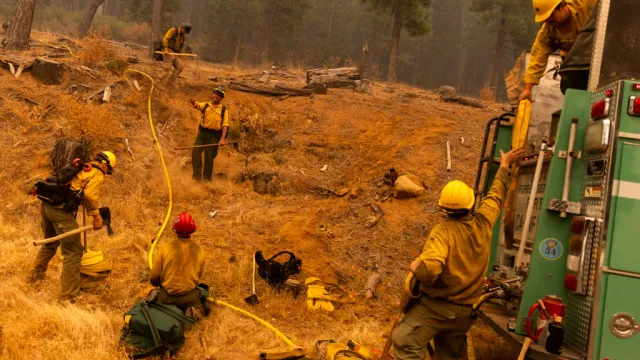
The Park Fire in northern California has reached approximately 400,000 acres in size, and already logging industry advocates are pushing out misinformation about the fire in an attempt to promote their deceptively-named Fix Our Forests Act logging bill. The timber industry’s political apologists tell us that the Park Fire grew so big, so fast ostensibly because public forestlands are “overgrown” and in need of “thinning.”
They tell us that we can solve this problem by passing the Fix Our Forests Act, which would roll back bedrock environmental laws to give logging companies even greater access to mature and old trees on our national forests and other public lands.
As with other large wildfires in recent years, the self-serving claims made by logging interests while fires burn do not stand up to even casual scrutiny. In fact, about three-quarters of the Park Fire isn’t even in conifer forest. Mostly it has burned through open oak woodlands and grass savannas with widely scattered trees. Of the approximately one-quarter of the fire that is comprised of conifer forest, most of that is private industrial timberland where intensive logging, including “thinning,” has occurred for many years.
The truth is that this “overgrown forests” narrative, which is being spun by the logging industry and its political apologists, is a new and insidious type of climate change denialism. It not only downplays the role of extreme weather and climate change in big wildfires, it also promotes widespread removal of trees from our best carbon sinks—our forests. Scientific research tells us that logging conducted under the rubric of thinning emits about three times more carbon into the atmosphere, per acre, than wildfire alone.
Moreover, many scientists, including a growing list of U.S. Forest Service scientists, are finding that denser public forests tend to burn at lower, not higher, intensities in wildfires. As one group of U.S. Forest Service scientists found, denser, older forests with high canopy cover had lower fire severity and “buffer the negative effects of climate change” regarding wildfires, largely due to a less fire-prone microclimate in dense forests.
The scientists explained this effect succinctly: “Thinned forests have more open conditions, which are associated with higher temperatures, lower relative humidity, higher wind speeds, and increasing fire intensity. Furthermore, live and dead fuels in young forest or thinned stands with dense saplings or shrub understory will be drier, making ignition and high heat more likely, and the rate of spread higher because of the relative lack of wind breaks provided by closed canopies with large trees.”
In the era of the climate crisis, we need to protect our carbon sinks, and keep the carbon in our forests, just as we need to keep the carbon in the ground, while we shift away from fossil fuels. We do not have the luxury of time to entertain misinformation from one of the very industries that is responsible for getting us into the climate crisis in the first place.
The so-called Fix Our Forests Act is nothing but a logging industry sham that would not only worsen climate change, but could also make wildfires spread faster toward vulnerable towns. It is the wrong idea at the wrong time.